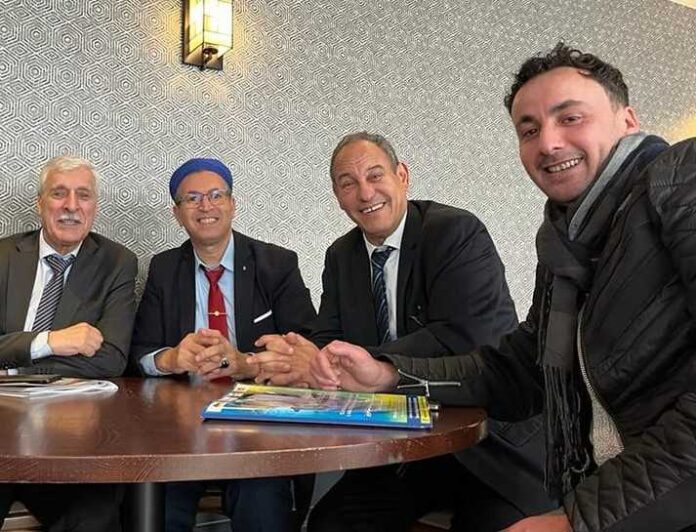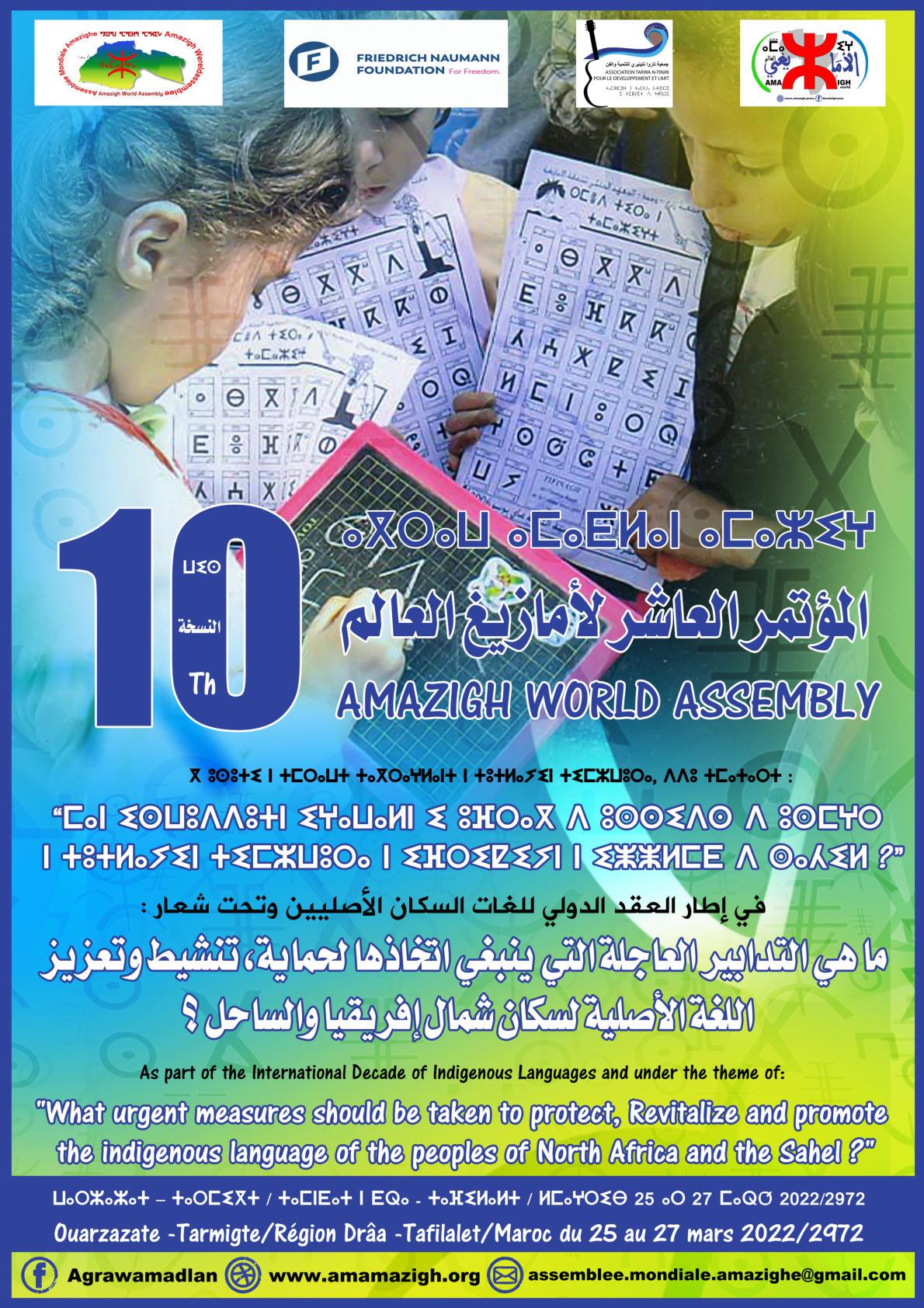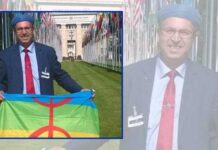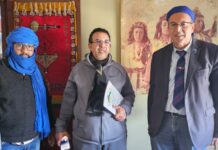By: Rachid RAHA, President of the World Amazigh Assembly
On this November 1st, marking the 70th anniversary of Algeria’s revolutionary insurrection and the 62nd of its independence, we wish to draw international public attention to the Amazigh issue and the state of human rights concerning its indigenous populations.
Despite Algeria being a pioneer in recognizing Amazigh identity and rights, following the Amazigh Spring of 1980, the introduction of the Amazigh language in schools in 1995 (after the “schoolbag strike”), and its recognition as a national language in 2002 and an official language in the 2016 constitutional reform, the Algerian state deliberately practices an anti-Amazigh apartheid policy. The Algerian generals, who hold true power in Algeria, are responsible for various crimes against indigenous Amazigh communities. One example is the bloody repression of the “Black Spring,” where the Algerian gendarmerie killed 127 young people and injured over 10,000 in the Kabylie region in April 2001.
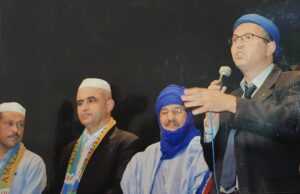 Our friend Belaid Abrika, a leader of the Aarchs, who is currently and unjustly sentenced to three years for daring to remember the Berber Spring of April 20, 1980, had the honor of accompanying me to the European Parliament in November 2009 to present a complete file on these serious human rights violations to Vice-President Isabelle Durant. To this day, no officer has been brought before military or civil courts!
Our friend Belaid Abrika, a leader of the Aarchs, who is currently and unjustly sentenced to three years for daring to remember the Berber Spring of April 20, 1980, had the honor of accompanying me to the European Parliament in November 2009 to present a complete file on these serious human rights violations to Vice-President Isabelle Durant. To this day, no officer has been brought before military or civil courts!
From 2013 through 2014 and 2015, it was the turn of the Mozabite riots. The Mozabites, an Amazigh community of over 200,000 practicing the Ibadi religion, faced attacks from the so-called “Arab” Chaâmbas community, who burned their shops and homes. Rather than protect them, authorities cracked down on the Mozabites, with riots resulting in deaths, destruction, and looting, followed by the imprisonment and persecution of their leaders, including the hunger-strike death of their leader, Dr. Kameleddine Fekhar, during Algeria’s Hirak movement. Other leaders, like Khodir Sekkouti and Salah Abbouna, fled to Spain, where they faced detention due to Algerian claims of terrorism. Our NGO’s lawyer in Madrid successfully stopped the Spanish government’s extradition orders in October 2017, allowing them to receive political asylum.
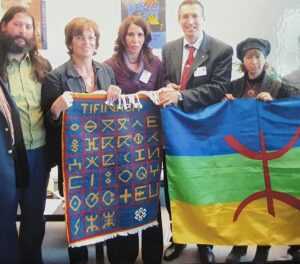 The Algerian generals continue their racially discriminatory policies against Amazigh activists, leading to arbitrary arrests, prosecutions, and swift sentencing. The Kabylie Self-Determination Movement (MAK), chaired by singer Ferhat Mehenni, is non-violent but is labeled a terrorist organization, enabling the persecution and imprisonment of numerous Kabyle activists like Bouaziz Ait Chebib and Kamira Nait Sid, who just completed a three-year prison sentence. Now, she’s threatened with new political charges. Meanwhile, Mohand Taferka, a 75-year-old defender of Amazigh culture and a prominent figure in the Kabyle diaspora in France, is now sentenced to an additional year in prison on the false charge of “undermining national integrity” .
The Algerian generals continue their racially discriminatory policies against Amazigh activists, leading to arbitrary arrests, prosecutions, and swift sentencing. The Kabylie Self-Determination Movement (MAK), chaired by singer Ferhat Mehenni, is non-violent but is labeled a terrorist organization, enabling the persecution and imprisonment of numerous Kabyle activists like Bouaziz Ait Chebib and Kamira Nait Sid, who just completed a three-year prison sentence. Now, she’s threatened with new political charges. Meanwhile, Mohand Taferka, a 75-year-old defender of Amazigh culture and a prominent figure in the Kabyle diaspora in France, is now sentenced to an additional year in prison on the false charge of “undermining national integrity” .
Journalist and writer Hichem Aboud, a Chaoui member of our NGO, has bravely exposed the massacres committed against civilians during Algeria’s “Black Decade” in his best-seller “The Generals’ Mafia”, recounting the deaths of over 200,000 people and tens of thousands of disappearances. He narrowly escaped abduction by Algerian intelligence agents in Spain on October 17, but the Spanish Guardia Civil freed him the next day in Lebrija.
Why do Algerian authorities pursue such an anti-Amazigh apartheid policy?
One possible reason is that “high-ranking officers,” many of whom are deserters from the French Army (known as DAF), suffer from a colonial inferiority complex. As the famous anti-colonial psychiatrist Frantz Fanon, who was deeply committed to the Algerian revolution, explained in Black Skin, White Masks, colonized people often internalize the culture of the colonizers, rejecting their own. This perspective rings true for the “Algerian generals” of Amazigh origin, who, in repressing their own people, believe they will gain approval from their supposed “Arab” leaders. Moreover, following Algeria’s independence, President Ahmed Ben Bella declared in his October 5, 1962, speech, “We are Arabs, ten million Arabs!” He insisted on “Arabism” as Algeria’s future, disregarding the indigenous Amazigh identity as a threat to national unity. Every Algerian president since then has similarly proclaimed “Arabness,” from Houari Boumediene to Abdelmadjid Tebboune, while in reality, they are merely Arabized Amazighs.
It is no coincidence that many Algerian officers, such as the late General Gaïd Salah and other generals, are of Amazigh descent and notorious for their harsh repression of fellow Amazighs. General Kabyle Tewfik Medienne, for example, is believed to be behind the 1998 assassination of the famous rebellious singer Lounès Matoub.
During President Abdelaziz Bouteflika’s rule, his Kabyle minister Khalida Toumi Messaoudi detained fifty Moroccan Amazigh activists at the Houari Boumediene Airport in Algiers for 38 hours, preventing them from attending the fifth general assembly of the World Amazigh Congress in Tizi-Ouzou on October 29, 2008.
Ultimately, the Algerian generals, who have seized power, betray the ideals of the November 1, 1954 martyrs, behaving as neo-colonial “Arabists,” openly practicing an “anti-Amazigh apartheid” policy and enforcing state terrorism against Amazigh citizens as though they were internal enemies. Given their unforgettable and bloody crimes, it is our duty, now more than ever, to bring them before the International Criminal Court in The Hague. Any assistance towards this goal is most welcome.


